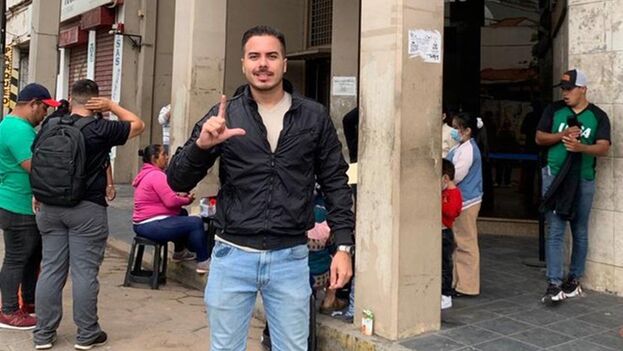
![]() 14ymedio/EFE, Havana, 21 December 2022 — The Bolivian Government announced on Wednesday the expulsion of Cuban activist Magdiel Jorge Castro, made public on Monday.
14ymedio/EFE, Havana, 21 December 2022 — The Bolivian Government announced on Wednesday the expulsion of Cuban activist Magdiel Jorge Castro, made public on Monday.
The Minister of Government (Interior), Eduardo del Castillo, told the media, including the Spanish agency EFE, that “any foreign citizen who settles in national territory must comply with legal and current regulations” and that if the General Directorate of Migration has determined that the Cuban citizen has “breached the rules” then he must “leave the country.”
“Any citizen who violates our regulations, who commits offenses or crimes, will have to comply with the corresponding sanction,” Del Castillo said.
Magdiel Jorge Castro said on his networks on Wednesday that he presented an appeal for reversal of the order, which forces him to leave Bolivia, where he now resides, within the next 15 working days. “I will wait for the response within the deadlines that Bolivian law determines,” he tweeted.
On Monday, the activist denounced his case, and told this newspaper that when he arrived at Migration, where he was summoned, “there was a whole folder with my tweets, as State Security tends to do in Cuba.” He asked which of his publications violated the law but “they didn’t know how to tell me.”
The immigration order, shown to this newspaper, indicates that Castro “infringed Bolivian regulations, altering public order through social networks.” Therefore, the text, dated December 16, 2022, continues, “he is granted the temporary mandatory exit order.”
By “acts that alter public order,” the document cites, “participation and/or incitement to unrest, confrontation between citizens and acts against morality and/or dignity.”
On Tuesday, Castro gave an interview to Cuban influencer Alex Otaola, where he described the Bolivian government’s decision as “political persecution” against him, while warning of the dangerous precedent this sets for other Cubans seeking asylum in third countries.
Bolivia and Cuba moved closer again with the Government of Luis Arce, after the suspension of diplomatic relations with Cuba by the then-interim president of Bolivia, Jeanine Áñez, who is now in prison.
The Bolivian president was received last week by his Cuban counterpart, Miguel Díaz-Canel, in Havana, where he also attended the extraordinary session of the National Assembly in commemoration of the eighteenth anniversary of the creation of the Bolivarian Alliance for the Peoples of Our America – Treaty of Commerce of the Peoples (Alba-TCP).
For Castro, as he stated in his conversation with Otaola, this visit is directly related to his expulsion from Bolivia.
Translated by Regina Anavy
____________
COLLABORATE WITH OUR WORK: The 14ymedio team is committed to practicing serious journalism that reflects Cuba’s reality in all its depth. Thank you for joining us on this long journey. We invite you to continue supporting us by becoming a member of 14ymedio now. Together we can continue transforming journalism in Cuba.
